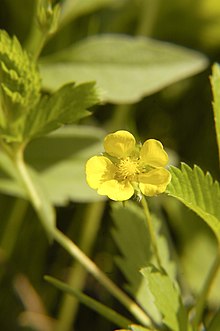This is an old revision of this page, as edited by Micromesistius (talk | contribs) at 20:21, 8 March 2023 (added Category:Taxa named by André Michaux using HotCat, +cinquefoil bud gall wasp). The present address (URL) is a permanent link to this revision, which may differ significantly from the current revision.
Revision as of 20:21, 8 March 2023 by Micromesistius (talk | contribs) (added Category:Taxa named by André Michaux using HotCat, +cinquefoil bud gall wasp)(diff) ← Previous revision | Latest revision (diff) | Newer revision → (diff) Species of flowering plant
| Potentilla simplex | |
|---|---|

| |
| Conservation status | |
 Secure (NatureServe) | |
| Scientific classification | |
| Kingdom: | Plantae |
| Clade: | Tracheophytes |
| Clade: | Angiosperms |
| Clade: | Eudicots |
| Clade: | Rosids |
| Order: | Rosales |
| Family: | Rosaceae |
| Genus: | Potentilla |
| Species: | P. simplex |
| Binomial name | |
| Potentilla simplex Michx. | |
Potentilla simplex, also known as common cinquefoil or old-field five-fingers or oldfield cinquefoil, is a perennial herb in the Rosaceae (rose) family native to eastern North America from Ontario, Quebec, and Labrador south to Texas, Alabama, and panhandle Florida.
Potentilla simplex is a familiar plant with prostrate stems that root at nodes, with yellow flowers and 5-parted palmately pinnate leaves arising from stolons (runners) on separate stalks. Complete flowers bearing 5 yellow petals (about 4-10 mm long) bloom from March to June. It bears seed from April to July. It is commonly found in woodlands, fields, and disturbed areas. Along with Potentilla canadensis, the plant is an indicator of impoverished soil as well as the host species for the cinquefoil bud gall wasp Diastrophus potentillae.
Pollinators include mason bees, small carpenter bees, cuckoo bees, halictid bees, syrphid flies, tachinid flies, blow flies, and others. Less common pollinators are wasps and butterflies. Rabbits and groundhogs eat the foliage.
Young shoots and leaves are edible as a salad or pot herb.
References
- Weakley, Alan S. (May 2015). Flora of the Southern and Mid-Atlantic States. Chapel Hill, NC, USA: The University of North Carolina Herbarium. p. 585–587.
- ^ "Plants Profile for Potentilla simplex (common cinquefoil)". USDA Natural Resources Conservation Service. Retrieved 28 Mar 2016.
- "Common Cinquefoil (Potentilla simplex)". Lady Bird Johnson Wildflower Center. Retrieved 28 Mar 2016.
- Niering, William A.; Olmstead, Nancy C. (1985) . The Audubon Society Field Guide to North American Wildflowers, Eastern Region. Knopf. p. 753. ISBN 0-394-50432-1.
- "Diastrophus potentillae". Gallformers. gallformers.org. Retrieved 8 March 2023.
- "Potentilla simplex (common cinquefoil)". John Hilty. Retrieved 28 Mar 2016.
- "Cinquefoil Herb Use". Alternative Nature Herbals. Retrieved 28 Mar 2016.
| Taxon identifiers | |
|---|---|
| Potentilla simplex |
|
This Rosaceae article is a stub. You can help Misplaced Pages by expanding it. |